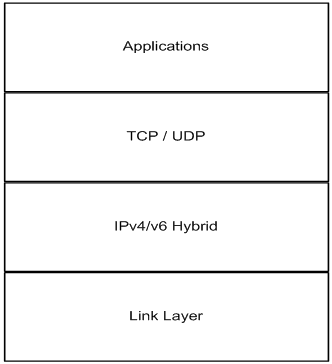IPv4/IPv6
The IP protocol is responsible for routing the data between networks and it employs an addressing system to achieve this. The Internet protocol version 4 (IPv4) has a number of security problems and lacks privacy and authentication mechanisms below the application layer. IPv6 provided numerous security enhancements, such as mandatory implementation of Authentication Header and Encapsulated Security Payload.
IPv4/IPv6 hybrid Internet protocol stack that enables applications to choose the protocol to use or automatically select it according to address type. This feature is supported from Symbian OS v7.0s onwards.

Figure: IPv4/IPv6 hybrid-protocol stack
It is possible to establish a secure connection from an application to an application using TLS 3.0 and SSL 3.0. A secure communication can also be enabled at the Network layer using IPSec both in transport and tunnel mode. Though IPSec can be configured to provide secure tunnel between two routers, Symbian IPSec is not tested for secure router-to-router connectivity.
Security features implemented in low-level protocols (for example, IPv6) are automatically available to higher-level protocols and applications. For more information, see Networking Services Guide .